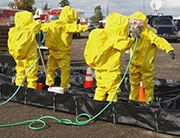- Could Your Grocery Store Meat Be Causing Recurring UTIs?
- Are You Making This Expensive Thermostat Error This Winter?
- Recognizing the Signs of Hypothyroidism
- 10 Strategies to Overcome Insomnia
- Could Artificial Sweeteners Be Aging the Brain Faster?
- Techniques for Soothing Your Nervous System
- Does the Water in Your House Smell Funny? Here’s Why
- Can a Daily Dose of Apple Cider Vinegar Actually Aid Weight Loss?
- 6 Health Beverages That Can Actually Spike Your Blood Sugar
- Treatment Options for Social Anxiety Disorder
WHO Declares Ebola Outbreak a ‘Public Health Emergency’


FRIDAY, Aug. 8 2014The World Health Organization on Friday declared the outbreak of deadly Ebola virus in West Africa a “public health emergency.”
The outbreak, which has already claimed 932 lives in Guinea, Liberia, Nigeria and Sierra Leone, “constitutes an ‘extraordinary event’ and a public health risk to other States,” WHO said in a statement. The declaration was based on the unanimous decision of an Emergency Committee meeting convened this week.
“A coordinated international response is deemed essential to stop and reverse the international spread of Ebola,” the organization said. Experts pointed to several ominous factors, such as the emergence of cases of Ebola in densely populated cities; cases arising among health-care workers that suggest “inadequate infection control practices;” and generally “fragile” health care systems.
WHO now recommends that each of the countries affected by the outbreak declare a national emergency, clearly inform the public of the situation, and ramp up efforts to limit transmission of the virus.
Earlier this week, the U.S. Centers for Disease Control and Prevention raised its response to the Ebola outbreak to its highest alert status. The move allows the CDC to expand its role in fighting the growing public health crisis, which gained new urgency as cases of the deadly infection began to be reported in populous Nigeria.
According to NBC News, a “level 1 activation” response has typically been reserved for only the most dire and pressing emergencies, such as the aftermath of Hurricane Katrina in 2005 or the bird flu outbreak in 2009. The CDC has already committed 50 more staff people to fly to the area of the outbreak over the next month, and more could follow.
Meanwhile, medical ethicists will meet next week to discuss who should have access to the limited supplies of an experimental medicine for the deadly Ebola virus, WHO said.
The drug was given to and benefited Dr. Kent Brantly and Nancy Writebol, two American aid workers who contracted the disease in West Africa. It was the first time the drug was tried on people, NBC News reported.
The maker of the drug has said it can’t produce large amounts of the experimental medicine, which means only a limited number of patients will be able to receive it. There is no certified vaccine or cure for Ebola.
“We are in an unusual situation in this outbreak,” WHO official Dr. Marie-Paule Kieny said in a statement, NBC reported. “We need to ask the medical ethicists to give us guidance on what the responsible thing to do is.”
More information
Visit the CDC for more on Ebola.
Source: HealthDay
Copyright © 2026 HealthDay. All rights reserved.










